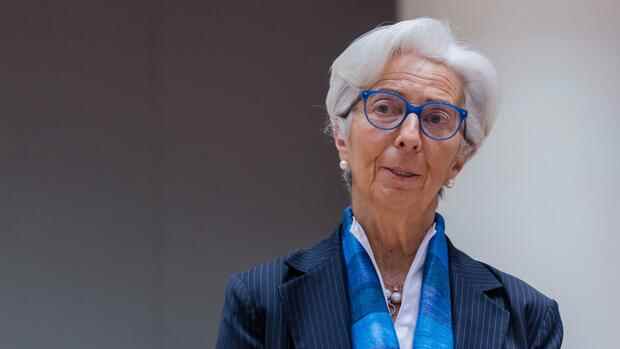Paris Despite high inflation in the euro area, ECB President Christine Lagarde is against rapid interest rate hikes. The European Central Bank does not have to be as aggressive in monetary policy as the US Federal Reserve is likely to do, Lagarde told French radio station France Inter on Thursday. “The cycle of economic recovery in the US is ahead of that in Europe,” said Lagarde. “So we have every reason not to move as quickly and ruthlessly as one might imagine with the Fed.”
The US Federal Reserve has already announced three interest rate hikes for 2022. She could raise the key rate as early as March. The reason for this is the high inflation. In the euro area, too, the rate of inflation has recently risen significantly. In December it had reached a record high of 5.0 percent.
However, the ECB intends to proceed much more slowly in tightening monetary policy. At its meeting in December, it decided to let a purchase program launched during the pandemic expire in March. But she wants to increase another program first. A rate hike this year is practically impossible.
However, the December resolutions were quite controversial in the Governing Council, as the minutes of the meeting published on Thursday show. Accordingly, the inflation risks were discussed intensively. In the view of some council members, a scenario of longer higher inflation cannot be ruled out.
Top jobs of the day
Find the best jobs now and
be notified by email.
According to Handelsblatt information from central bank circles, the warning voices included the then Bundesbank President Jens Weidmann and the ECB Director Isabel Schnabel, even if the latter nevertheless voted for the measures decided.
In the forecasts published at the time, the ECB assumes that the inflation rate in the currency area will fall again to 1.8 percent in 2023 and 2024. From the point of view of the group around Weidmann and Schnabel, who warn of inflation risks, it is already close to the target of two percent.
Since this prediction is subject to upside risks, it could easily come out above the target mark. According to the minutes, some meeting participants therefore urged the ECB to emphasize its willingness to adjust “all the instruments” in its monetary policy toolbox if necessary.
Impact of energy prices
From the point of view of Carsten Brzeski, economist at the major Dutch bank ING, the minutes show that there is a “more realistic debate about the various inflation scenarios” within the central bank. However, he assumes that the high rate of inflation will not fall quickly in the coming months. One of the reasons for this is that companies are passing on increased production costs to consumers.
In addition, in some European countries, energy prices for private consumers are often adjusted at the beginning of the year. Between April and December 2021, these accounted for more than half of the price increase in the euro area. Lagarde said in the radio interview that the ECB had already reacted to the increased inflation and was ready to take monetary policy measures should the data situation require it.
The loose monetary policy in the euro area has recently come under increasing criticism. The German economist Volker Wieland, for example, called on the central bank to raise interest rates in the current year.
The higher energy prices and their further impact on inflation are also currently the subject of controversy. Recently, the price of European Brent oil has risen to its highest level in more than seven years.
In its December inflation forecasts, which formed the basis for the monetary policy decisions, the ECB assumes that the price of oil will fall significantly again by 2024. Given the current price rally, however, that is questionable.
In the past, central bankers have mostly ignored fluctuations in energy prices, assuming that these usually only have a short-term impact. However, ECB Director Schnabel recently argued that the transformation towards a CO2-neutral economy could drive up energy prices and thus inflation in the longer term – for example because listed oil companies are no longer doing so to the same extent due to their obligation to reduce climate-damaging emissions react to the increased oil prices with new investments.
In Schnabel’s view, the ECB must therefore take energy prices more into account in its monetary policy under certain circumstances, especially if they are driving inflation expectations higher. These have recently increased. Inflation expectations are important for central bankers, as expectation of rising prices increases the risk of a wage-price spiral. In this scenario, higher prices and wages reinforce each other.
Measures against the real estate bubble
In the case of the real estate market, which is overheated in parts of the euro zone, the ECB is beginning to take action. ECB Vice President Luis de Guindos warned on Thursday that the overvaluation in certain residential markets is spreading. It is time to reflect that countermeasures are being taken in view of the risks to the financial system as a whole.
The German financial regulators have already taken steps in this direction: They want to demand a larger crisis cushion from the banks again because of increasing risks in the financial system and skyrocketing real estate prices.
More: The great nervousness before the turnaround in interest rates

